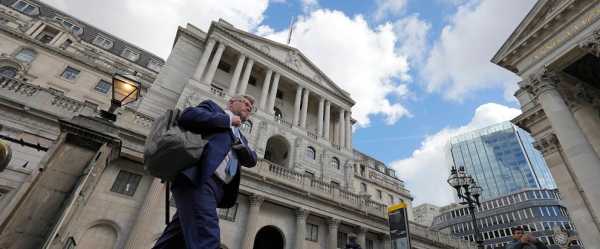
LONDON — The Bank of England on Thursday paused nearly two years of interest rate increases after a surprising fall in U.K. inflation eased concerns about the pace of price rises.
In a development that few predicted just two days ago, the central bank kept its main interest rate unchanged at a 15-year high of 5.25%. It comes to the relief of millions of homeowners who are facing higher mortgage rates.
Central banks worldwide appear to be near the end of an aggressive rate-hiking cycle meant to curb an outburst of inflation triggered by the bounceback from the COVID-19 pandemic and Russia’s war in Ukraine. The U.S. Federal Reserve also left rates unchanged Wednesday.
Clearly influencing the U.K. bank’s decision was news Wednesday that inflation unexpectedly fell to 6.7% in August, its lowest level since Russia invaded Ukraine in February 2022.
Four of the nine members of the Monetary Policy Committee voted for a hike. The five who voted to keep rates on hold said inflation had been “lower than had been expected” but that the decision was “finely balanced,” according to minutes from the meeting.
Those who backed a quarter-point hike said the surprise drop in inflation was due to one-off factors and judged that overall there was evidence of more “persistent inflationary pressures.”
Inflation is still way above the bank’s target rate of 2% and higher than in any other Group of Seven major economy. With that in mind, the bank indicated that borrowing rates won't be cut anytime soon.
“Monetary policy would need to be sufficiently restrictive for sufficiently long to return inflation to the 2% target,” the bank said. “Further tightening in monetary policy would be required if there were evidence of more persistent inflationary pressures.”
Higher interest rates, which cool the economy by making it more expensive to borrow and bearing down on spending, have contributed to bringing down inflation worldwide. Though most economies have avoided falling into recession, economic growth is subdued in many parts of the world.
While the decision to leave rates unchanged is a welcome development, it doesn't mean that Britain's cost-of-living crisis has ended. Inflation, though lower than expected, remains relatively high, as do food and energy costs.
And because there is a lag between actual rate hikes and mortgage rates, lots of homeowners and renters have yet to see increases in their housing costs.
Unlike in the U.S., for example, most homeowners in Britain lock in mortgage rates for only a few years, so those whose deals expire soon know that they face much higher borrowing costs in light of the sharp rise in interest rates over the past couple of years.
The Bank of England, like other central banks, has raised interest rates aggressively from near zero as it sought to counter price rises first stoked by supply chain issues during the coronavirus pandemic and then Russia’s invasion of Ukraine, which pushed up food and energy costs. U.K. inflation hit a peak of 11.1% in October 2022.
As inflation has eased, the hiking cycle looks to be nearing an end.
The Swiss National Bank also kept rates unchanged Thursday, but in a busy day for central bank action in Europe, Sweden's and Norway's central banks pushed ahead with quarter-point hikes.
The European Central Bank, which sets interest rates for the 20 European Union countries that use the euro currency, last week hinted that its 10th straight hike could be its last.
Sourse: abcnews.go.com






